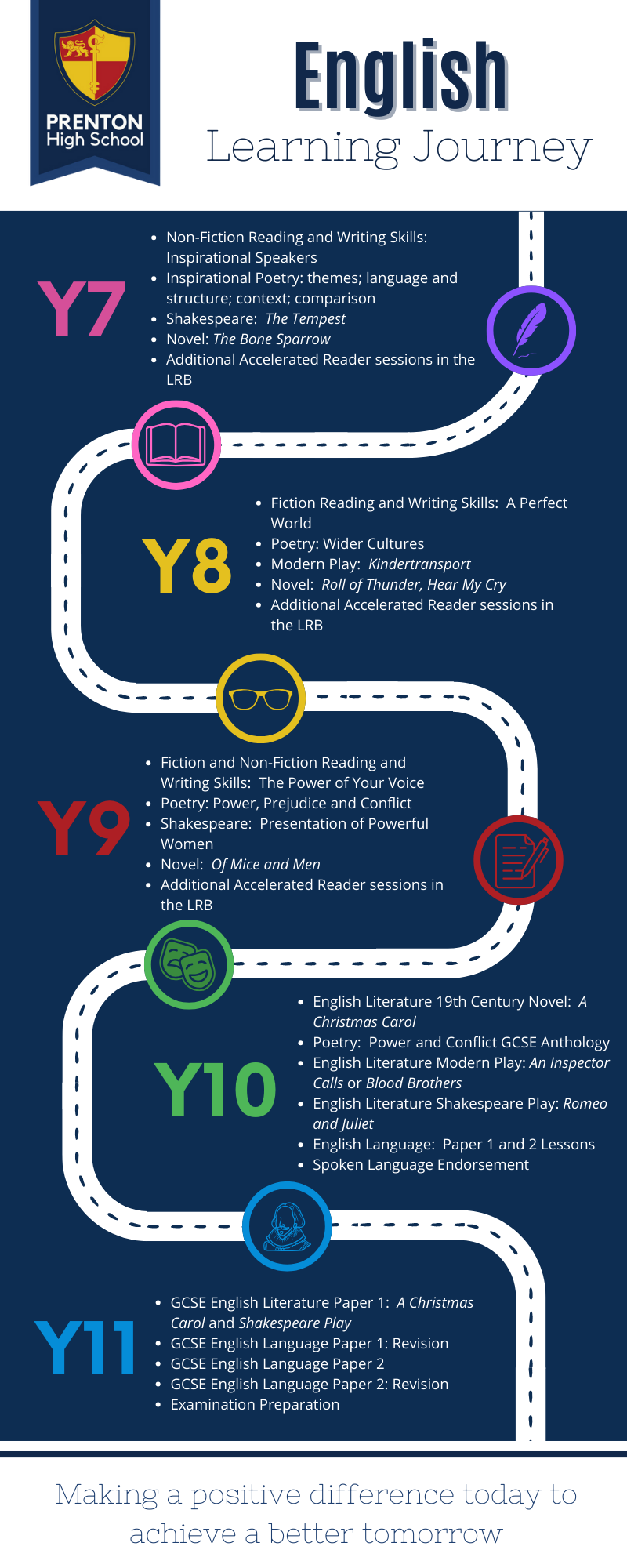
Video
Subject Information
Learning Journey
The English department consists of a close knit team who all teach across the age and ability range.
We encourage students to take an interest in all aspects of English, and run regular theatre trips. Our department has a number of members of staff who mark papers for GCSE examinations, giving us excellent insight into the requirements of the examinations sat by our students Our students are encouraged to develop and broaden their skills in English and English Literature. Students are given the opportunity to enter national competitions for poetry and speaking and listening; we are delighted that our students have won accolade in both of these areas. Key Stage 3 The English curriculum aims to ensure that students can read fluently and critically; write coherently and accurately for a range of purposes and audiences, using a wide vocabulary; and use Spoken Standard English to convey their ideas effectively.
The analysis of writers’ language techniques develops students’ own ability to use language effectively, and studying a varied and challenging set of literary texts, including novels, poetry and plays from different time periods and contexts, allows students to develop their own cultural and social awareness. The skills covered through English are lifelong communication skills, which students will use in a range of situations, from studying their GCSE courses, to writing applications for further education or training courses, to using Spoken Standard English in interviews, to communicating with colleagues in their chosen career.
Table of topics
| Year 7 | Year 8 | Year 9 |
| Reading and writing unit: Extracts of non-fiction texts of ‘Inspirational Speakers’ which leads to writing your own Inspirational non-fiction writing. | Reading and writing unit: Extracts of fiction texts of ‘A Perfect World’ including dystopia and utopian worlds. This leads to writing your own creative writing piece. | Reading and writing unit: Extracts of fiction and non-fiction texts of ‘The Power of Your Voice’. This leads to a group debate assessment and writing your own speech using the power of your voice. |
| Poetry: Inspirational Poems. | Poetry: Poems of different cultures. | Poetry: Power of love and conflict. |
| Shakespeare play: ‘The Tempest’. | Modern Play: ‘KinderTransport’ | Extracts of powerful women from Shakespeare’s plays. |
| Whole novel: ‘The Bone Sparrow’ and Creative Writing. | Whole novel: ‘Roll of Thunder Hear Me Cry’ and Creative Writing. | Whole novel: ‘Of Mice and Men’ and Creative Writing. |
Key Stage 4
The fundamental aim of the curriculum is to teach students the knowledge and skills required to gain GCSEs in English Language and English Literature. Some students will be offered an Entry Level Certificate in English. The GCSE English Language course aims to develop students’ critical reading skills; their ability to write coherently and accurately, using an extensive vocabulary; and their ability to use Spoken Standard English effectively. Students read a range of fiction and non-fiction texts, analysing how writers use language to create effects, then apply this knowledge when producing their own writing. Through GCSE English Literature, students explore prose, poetry and drama, allowing them to appreciate the power of the English literary heritage, and develop their own social and cultural awareness. The skills covered are lifelong communication skills, which students will use in a range of situations, from writing applications for further education or training courses, to using Spoken Standard English in interviews, to communicating with colleagues in their chosen career.
Table of Topics
| Year 10 | Year 11 |
| Modern prose: An Inspector Calls, J. B. Priestley or Blood Brothers, Willy Russell 19th century novel: A Christmas Carol – Charles Dickens Poetry: Power and Conflict cluster Spoken Language Endorsement Shakespeare play: Romeo and Juliet | Explorations in Creative Reading and Writing Writers’ Viewpoints and Perspectives Unseen Poetry Revision and exam technique: GCSE English Language Revision and exam technique: GCSE English Literature texts |
| GCSE English Language (AQA 8700) | GCSE English Literature (AQA 8702) |
| Nature of examination: 2 x written exams Section A – reading Section B – writing Paper 1 Explorations in Creative Reading 1 hour 45 minutes 50% of final grade Paper 2 Writers’ Viewpoints and Perspectives 1 hour 45 minutes 50% of final grade *AQA also offer a Spoken Language Endorsement assessed separately. | Nature of examination: 2 x written exams Paper 1 – Shakespeare and the 19th century novel 1 hour 45 minutes 40% of final grade Section A – Shakespeare Section B – 19th century novel Paper 2 – Modern texts and poetry 2 hours 15 minutes 60% of final grade Section A – An Inspector Calls or Blood Brothers Section B – Power and Conflict poetry Section C – Unseen poetry |
Entry Level Certificate:
Step Up to English (AQA 5970)
This qualification may be offered to some students to support them in building basic and relevant literacy skills that meet the requirements of a wide range of post 16 courses and workplace settings. Students will study a wide variety of thematic units, undertaking a range of reading, writing and spoken language tasks before completing an externally set exam paper.
This qualification compliments the GCSE English Language and Literature course by helping to embed many of the key concepts taught in compulsory GCSE English lessons. Both courses share a number of key assessment objectives, thus giving the candidates many opportunities to develop their English and Literacy skills.
The assessment for this qualification is broken down into two components:
Component One – Literacy Topics
Detectives
Hobbies
Leisure
Music
The Next Step
Component Two – Creative Reading and Writing
Exploring
Gothic Horror
Heroism
Myths and Legends
Sport
All students are required to submit two exam papers from component one and one exam paper from component two. The assessment skills for both components focus on reading, writing and spoken language. The papers for this qualification are tiered and students will be entered for either the gold or silver step paper. The gold step paper awards a level 3 pass. The silver step awards either a level 1 or 2 pass.
Find out more about GCSE English Language

Miss G Davies | Subject Leader – English | daviesg@prentonhighschool.co.uk

